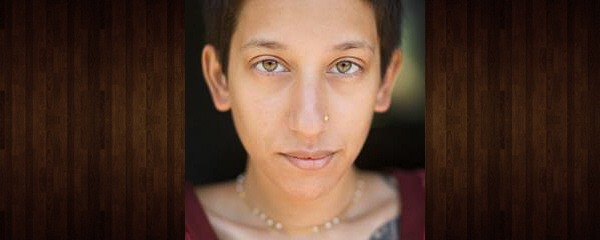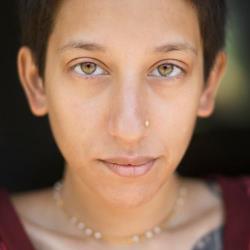
photo by Richard Boll
by Bidisha
A short story need not be short or tell a story. It may, like life, span twenty themes in one character’s brief scene of realisation or follow one theme across twenty years and forty pages. It can be real or surreal. It may describe distinct moments of epiphany or memory or long tranches of varying and sometime contradictory events, actions and reactions. It can take any shape, be in any voice, lend itself to any genre or setting – I grew up reading science fiction short stories and was then reprimanded by my GCSE teachers for not exploring “proper” literature. It can be driven by energy, by personality, by atmosphere, by polished prose, by structure, by sinister concision or expansive comedy. It can be like a compressed Greek tragedy, a passing bubble of Noel Cowardly banter, a family saga or house-history.
What matters, as in all art, are the integrity and sincerity of the artist, the care they have taken in crafting the work, in thinking about it, planning it, reading, balancing it, honing it and editing it over time. Sloppy writing is sloppy writing and a short form is no excuse for careless craft; in fact, deficiencies of language, structure, ideas and style are glaringly obvious. This is why short stories are much harder to write than novels.
“You labour for months making it seem as though it just flowed in five minutes.”
I once attended a book reading at which the legendary contemporary writer Janice Galloway said, “You labour for months making it seem as though it just flowed in five minutes.” I’d agree with that. She also said, “Writing is the last great cottage industry.” I’d agree with that too. An economist colleague once remarked, in a recent talk about budget cuts, “People think that because children are small, they’re cheap.” I feel the same way about short stories: people think that because they’re small, they’re worth less, easier to look after, less worth heeding, less relevant, less difficult. But it’s harder to craft an ivory miniature than an anvil; and a stiletto knife cause more fatal damage than a rough-hewn cudgel.
Everything in culture is a matter of taste and, for me, form and polish are supreme qualities, as are depth and poise. Some of my favourite (and famous) short stories and novellas are exquisitely planned, deeply intelligent adult works which take often lurid ideas and turn them into things of universal meaning. I’m thinking here of Thomas Mann’s ‘Death in Venice’, Henry James’s ‘A Turn of the Screw’ and Daphne Du Maurier’s ‘The Birds’ and ‘Don’t Look Now’. In the short form, no single word can be out of place: the choir is so small, everyone knows who the duff singer is.
The world of the short piece must make sense within itself, according to its own rules. It must have cohesion and structure. A bit of cultural tat that has been knocked off with nary a thought or care, be it an opera or a haiku, leaves the reader feeling cheated and unsatisfied. Something I have learned as a writer over many years is that readers are extremely perceptive, sensitive to the finest nuances and fluctuations on a writer’s concentration and purpose. If they sense that something is going nowhere, they will skip – in a novel it’s a few pages, with a short story it’s straight to THE END.
The best work of fiction I ever created was a short story called ‘Dust’, published in an anthology by the Tindal Street Press late last year. It took me eight years to write. It was worth it. It’s about a teacher who has been bereaved of her mother and returns to her old job after two years of mourning. She meets a colleague who is newly arrived from a country village and whose disturbed son is a student at the school. The protagonist takes this pupil under her wing.
It’s amazing how obvious necessary changes are when you look at something with fresh eyes. By the end, each comma had been placed, replaced, re-placed and buffed.
‘Dust’ began as a novel, which I whittled down, tightened and packed until it was perfect. In the end, I lost none of the major scenes I had initially planned; the finished short story became an incredibly intense collection of flashpoints, clashes, sudden meetings. All bone and muscle, no fat. The eight years were worth it: months of work, a painful page a day, interspersed with months in the bottom drawer. It’s amazing how obvious necessary changes are when you look at something with fresh eyes. By the end, each comma had been placed, replaced, re-placed and buffed. The characters, events, backstories and ideas were intensely concentrated and wholly integrated, yet none of these mechanics are apparent from the outside. Instead, the story seems driven by emotion and event, by the characters’ pain, secrets and hypocrisies. The final catharsis, when it comes, is devastating for the characters. I have no idea if the story is any good or not – I can only say that it has finally come out exactly as I wanted, and I wouldn’t change a thing. For all its seriousness, I haven’t thought about it since it was published. It doesn’t nag. The dissatisfaction of imperfection doesn’t haunt me. That’s when you know you’ve done the best you possibly could.
It was the experience of writing ‘Dust’ that taught me just how important short stories can be.
For all their brevity, they have great density, both culturally and artistically. As children and even late into our teens, we are reared not on novels or poetry but on short stories, often from diverse cultures: creation myths, legends, fairytales, even jokes and nursery rhymes in which incy wincey spiders climb up spouts, pigs return from the market and wolves attempt to blow down their houses, a blonde girl breaks and enters into a bear family’s house and dicks with their furnishers, and children playing ring-a-ring-a-roses fall down and die when they sneeze. I’m pretty sure the latter was an allusion to the medieval plague but at nursery I never thought to ask.
Children’s games are themselves wonderful fantasy stories with extremely evocative names: dead lions, musical chairs, grandmother’s footsteps.
Our tastes calcify and snobbify as we grow older. We learn to judge and make distinctions. But these distinctions are themselves cultural. In Britain, there is great nurturing of the short story at an academic level: it is a standard (but shockingly difficult) assignment for creative writing students; there are short story competitions run by the BBC, the Sunday Times, Mslexia and many more arts institutions and publications; students learn at the hard end. Far easier to write a big baggy novel than a taut thrillerine of 10,000 words or less. However, the interest and rigour of short stories is not supported at an industry level. Agents will encourage writers to bring out full length works, not shorts collections; publishers will barely bother to put in an offer on a short story collection, even if it is excellent, if it’s not by an established name. There are some publishers who strike out from the crowd, however, and here I want to mention the excellent Limehouse Books, who in recent years have produced extremely original, inclusive, diverse and beautifully presented collections of contemporary urban literature, vampire stories, gay and lesbian stories and much more. They’re single-handedly celebrating the greatness of shortness.
…short stories offer a vision of perfection…
In America and Canada, the story is very different. Well-respected publications from The New York Times down carry short stories. Editors at publishing houses welcome stories and produce them with lavish love and great fanfare. Writers such as Raymond Carver, Lydia Davies, Lorrie Moore and Alice Munro – whose stories take her around eight months each, she has said – are acknowledged geniuses of the art.
So the contemporary British artist is in a tricky position. She or he has chosen the toughest form in the toughest environment.
Why do we bother?
Because short stories offer a vision of perfection. Because, when they achieve perfection, which is what every artist aims for, they are diverse, brilliant, deep, dazzling and unforgettable. Because, when an idea has been tightened, skinned, moulded, crafted until it can be honed no more, what remains is crisply worded bliss.
*
Some of my favourite short story writers…several of whom write equally excellent novels, plays, poetry, journalism, kids’ tales and other types of literature.
Angela Carter – a genre-crossing, myth-debunking genius who died twenty years ago this year and is the author of classic novels including Wise Children and Nights at The Circus. She also wrote two short story collections of genius, Black Venus and The Bloody Chamber. Freewheeling, fast, fantastical, intelligent and thrilling, Carter is a writer who’ll make your head expand.
Doris Lessing – pretty much the greatest living writing currently working in the English language, the recipient of the Nobel Prize in her eighties (about three decades overdue). Lessing is another author who can do social realism, speculative fiction, romance, memoir and war fiction with equal mastery. She is the author of several collections of impeccable, serious, grown-up fiction which will make you think. Her vision of humanity is absolutely unsparing and devastatingly intelligent.
A. S. Byatt – again, the author of countless Booker-winning and Booker-nominated novels, Byatt is an erudite and thrilling author of short stories inspired by everything from international folk tales to contemporary art and other great works of literature. She is a wholly contemporary writer with a style of perfection and poise, who is nonetheless capable of being transported (and transporting the reader) by references to myth, magic, art and legend.
And…
Michele Roberts, Helen Simpson, Elliot Perlman, Etgar Keret, Salley Vickers, Sarah Hall, A. L. Kennedy, Janice Galloway, Sarah Salway, Alison MacLeod, Isak Dinesen, Thomas Mann, Jon MacGregor, Xialuo Guo, Yiyun Li, Pettina Gappah, Z. Z. Packer, Amy Bloom, Sarah Maitland, Holly Black, Helen Dunmore, Dubravka Ugresic and… of course, Hans Christian Anderson and the Brothers Grimm.
*
Read Bidisha’s story…
Dust
Bidisha is a writer, broadcaster and critic. At the age of 16, she was signed by Harper Collins and subsequently published her first novel Seahorses (1997), at 18. Her second novel, the thriller Too Fast to Live was published three years later. Her third book the bestselling travel memoir Venetian Masters came out in 2008. She currently writes for the Financial Times, Mslexia, The Observer, New Statesman and The List and The Guardian and presents for the BBC. She has judged the Orange Prize, the Bristol Short Story Prize, the Polari Prize and the John Llewellyn Rhys Prize. Her story ‘Dust’, published in the Tindal Street anthology Too Asian, Not Asian Enough (2011), marks her return to writing fiction after an absence of 11 years.



I never tire of reading other writers’ struggles with the short story form. It gives me permission to forget all of the old “oughts” and “shoulds” which I bring into play. It has taken me a long time to forget the rules I impose on the writing process. I have numerous stories which are still in various stages of creation so it gives me hope that given time and work, they will achieve ‘perfection’. I sometimes wonder if I should just tear them up and start again, but they keep nagging at me, as you mentioned, so they must have something to say. And not every reader is going to like what I’ve written. I’m starting to make peace with this. Ultimately, I have the final say of when a story is done or not. I just have to trust my instincts.
Thanks for sharing your struggle and triumph and I look forward to reading your story.